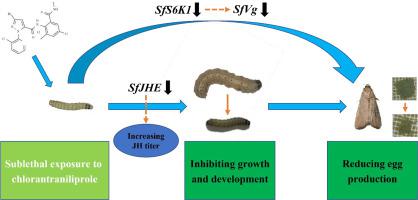Pesticide Biochemistry and Physiology ( IF 4.2 ) Pub Date : 2023-02-01 , DOI: 10.1016/j.pestbp.2023.105362 Jie Yang 1 , Daojie Guan 1 , Jiaping Wei 1 , Huichen Ge 1 , Xiaoli Cao 1 , Susu Lv 1 , Xiaoyang Zhou 1 , Yang Zheng 1 , Xiangkun Meng 1 , Jianjun Wang 1 , Kun Qian 2

|
It is well known that sublethal dose of insecticides induces life history trait changes of both target and non-target insect species, however, the underlying mechanisms remain not well understood. In this study, the effects of low concentrations of the anthranilic diamide insecticide chlorantraniliprole on the development and reproduction of the fall armyworm (FAW), Spodoptera frugiperda, were evaluated, and the underlying mechanisms were explored. The results showed that exposure of FAW to LC10 and LC30 chlorantraniliprole prolonged the larvae duration, decreased the mean weight of the larvae and pupae, and lowered the pupation rate as well as emergence rate. The fecundity of female adults was also negatively affected by treatment with low concentrations of chlorantraniliprole. Consistently, we found that exposure of FAW to LC30 chlorantraniliprole downregulated the mRNA expression of juvenile hormone (JH) esterase (SfJHE), leading to the increase of JH titer in larvae. We also found that treatment with low concentrations of chlorantraniliprole suppressed the expression of ribosomal protein S6 kinase1 (SfS6K1) in female adults, resulting in the downregulation of the gene encoding vitellogenin (SfVg). These results provided insights into the mechanisms underlying the effects of low concentrations of insecticides on insect pests, and had applied implications for the control of FAW.
中文翻译:

低浓度氯虫苯甲酰胺对草地贪夜蛾发育和繁殖影响的机制
众所周知,亚致死剂量的杀虫剂会导致目标和非目标昆虫物种的生活史特征发生变化,然而,其潜在机制仍未得到充分了解。本研究评估了低浓度邻氨基苯甲酸二酰胺类杀虫剂氯虫苯甲酰胺对秋粘虫 (FAW) 草地贪夜蛾 ( Spodoptera frugiperda)发育和繁殖的影响,并探讨了其潜在机制。结果表明,FAW暴露于LC 10和LC 30氯虫苯甲酰胺延长了幼虫的持续时间,降低了幼虫和蛹的平均重量,降低了化蛹率和羽化率。雌性成虫的生育能力也受到低浓度氯虫苯甲酰胺处理的负面影响。一致地,我们发现秋粘虫暴露于 LC 30氯虫苯甲酰胺会下调保幼激素 (JH) 酯酶 ( SfJHE )的 mRNA 表达,导致幼虫中 JH 滴度增加。我们还发现,用低浓度氯虫苯甲酰胺处理可抑制成年雌性核糖体蛋白 S6 激酶 1 ( SfS6K1 )的表达,导致编码卵黄蛋白原 ( SfVg)的基因下调). 这些结果提供了对低浓度杀虫剂对害虫影响的潜在机制的见解,并对秋粘虫的控制产生了影响。


















































 京公网安备 11010802027423号
京公网安备 11010802027423号